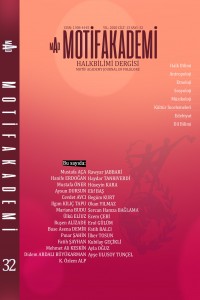Öz
Avrupa bağlamında bakıldığında Britanya da dahil olmak üzere göçün Avrupa’daki ülkelerin sosyo-ekonomik yapısını değiştirdiği ve onları postkolonyal toplumlara çevirdiği gözlemlenmektedir. Nitekim göç ve hareketlilik yaşam döngüsünün her aşamasında mevcuttur. Ayrıca insan göçü tarihin başlangıcından beri gerek güç yoluyla gerekse köleliğe ya da kolonileşmeye bağlı olarak gerçekleşti. Bu anlamda on dokuzuncu ve yirminci yüzyıllardaki göçler büyük ölçüde endüstrileşme ve küreselleşme bağlamlı idi. Britanya İkinci Dünya Savaşı’ndan itibaren güç kaybına uğradığı sömürgelerinden önemli oranda göçmen kabul etmiştir. Asya ve Afrika’dan göçmen akımı 1990’lara kadar devam etmiştir. Göçmenlik göç eden insanları bitmek bilmeyen bir ötekilik ve farklılık duygusuna maruz bırakmıştır. Yabancı bir ülkede daha iyi yaşam koşulları ile yaşama umudunu beraberinde getiren göçmen sosyal, kültürel ve psikolojik açıdan aşağılanma, ötekileştirilme, dışlanma gibi sorunlarla baş etmek durumunda kalır. Salman Rushdie’nin “İyi Nasihat Yakutlardan Bile Ender Bulunur” adlı kısa öyküsü İngiltere’ye göç etmeye çalışan Miss Rahena yoluyla insanlara dayatılan göçmen algısını ve ötekileştirmeyi ortaya koymak amacıyla incelenmiştir.
Abstract:
In the European context, it is observed that immigration has changed the socio-economic structures of the countries in Europe including Britain and turned them into postcolonial societies. Indeed, migration and mobility exist at every stage of the life cycle. In addition, human migration has occurred since the beginning of history, either by force or due to slavery or colonization. In this sense, migrations in the nineteenth and twentieth centuries were largely related to industrialization and globalization. Britain accepted a significant amount of immigrants from its colonies where it lost power since the Second World War. The flow of immigrants from Asia and Africa continued until the 1990s. Immigration has exposed immigrants to an endless sense of otherness and difference. Bringing the hope of living with better living conditions in a foreign country, the migrant has to deal with social, cultural and psychological humiliation, marginalization and exclusion. Salman Rushdie's short story "Good Advice Is Rare Than Rubies" has been examined in order to reveal the perception of immigrants and marginalization imposed on people through Miss Rahena trying to immigrate to England.
Anahtar Kelimeler
göç, göçmen, ötekileştirme, Britanya, postkolonyal, Rushdie,
Kaynakça
- Referans1 Giddens, Anthony. (2006). Sociology. Cambridge:Polity Press.
- Referans2 Chambers, Iain. (1995). Göç, Kültür, Kimlik, (çvr., İsmail Türkmen & Mehmet Beşikçi). İstanbul: Ayrıntı Yayınları.
- Referans3 King, Russell - Connell, John -White, Paul. (1995). Writing Across Worlds: Literature and Migration. New York: Routledge.
Öz
In the European context, it is observed that immigration has changed the socio-economic structures of the countries in Europe including Britain and turned them into postcolonial societies. Indeed, migration and mobility exist at every stage of the life cycle. In addition, human migration has occurred since the beginning of history, either by force or due to slavery or colonization. In this sense, migrations in the nineteenth and twentieth centuries were largely related to industrialization and globalization. Britain accepted a significant amount of immigrants from its colonies where it lost power since the Second World War. The flow of immigrants from Asia and Africa continued until the 1990s. Immigration has exposed immigrants to an endless sense of otherness and difference. Bringing the hope of living with better living conditions in a foreign country, the migrant has to deal with social, cultural and psychological humiliation, marginalization and exclusion. Salman Rushdie's short story "Good Advice Is Rare Than Rubies" has been examined in order to reveal the perception of immigrants and marginalization imposed on people through Miss Rahena trying to immigrate to England.
Anahtar Kelimeler
Immigration immigrant marginalization Britain postcolonial Rushdie
Kaynakça
- Referans1 Giddens, Anthony. (2006). Sociology. Cambridge:Polity Press.
- Referans2 Chambers, Iain. (1995). Göç, Kültür, Kimlik, (çvr., İsmail Türkmen & Mehmet Beşikçi). İstanbul: Ayrıntı Yayınları.
- Referans3 King, Russell - Connell, John -White, Paul. (1995). Writing Across Worlds: Literature and Migration. New York: Routledge.
Ayrıntılar
| Birincil Dil | Türkçe |
|---|---|
| Konular | Edebi Çalışmalar |
| Bölüm | Makaleler |
| Yazarlar | |
| Yayımlanma Tarihi | 15 Aralık 2020 |
| Gönderilme Tarihi | 11 Ekim 2020 |
| Yayımlandığı Sayı | Yıl 2020 Cilt: 13 Sayı: 32 |


